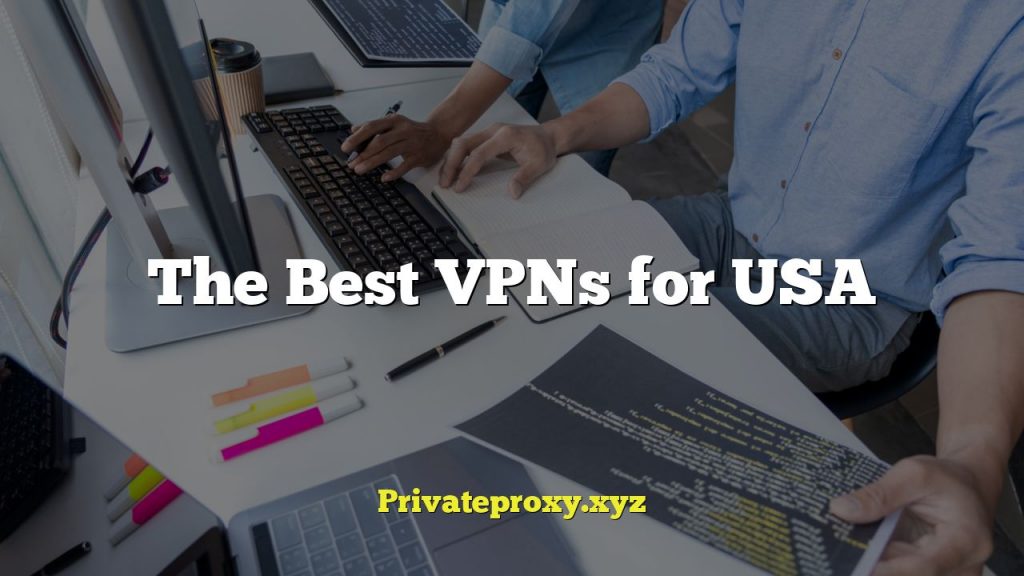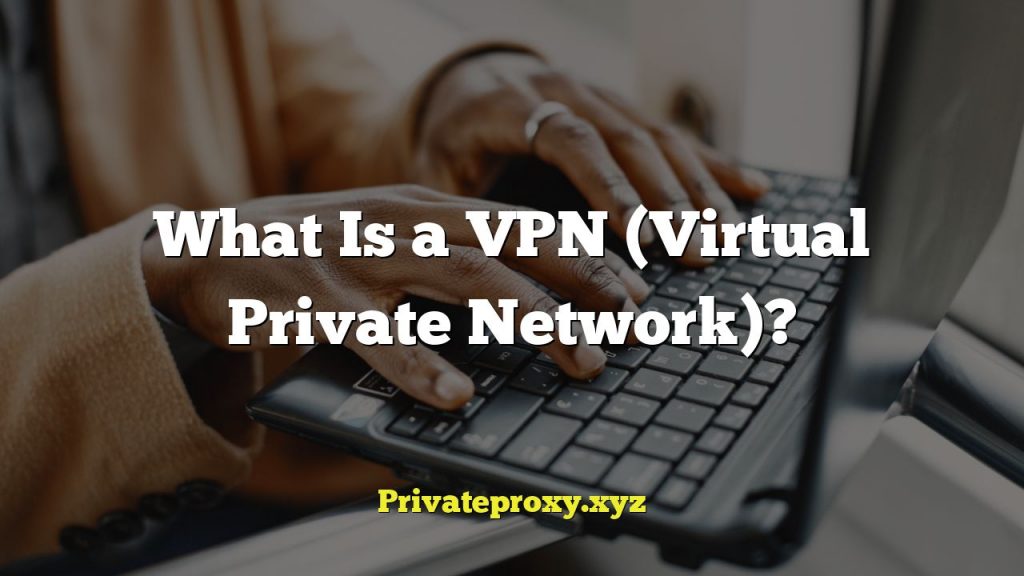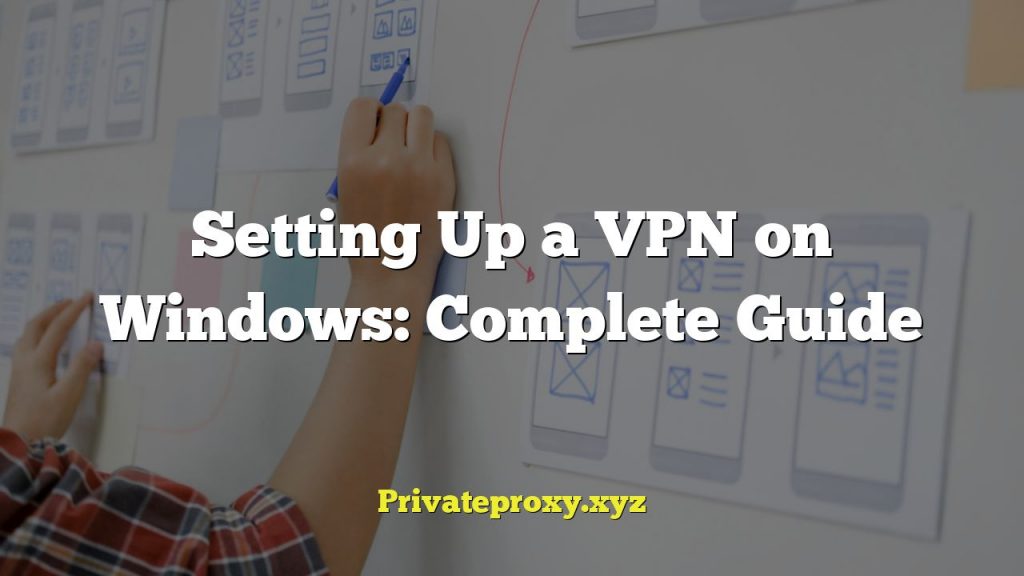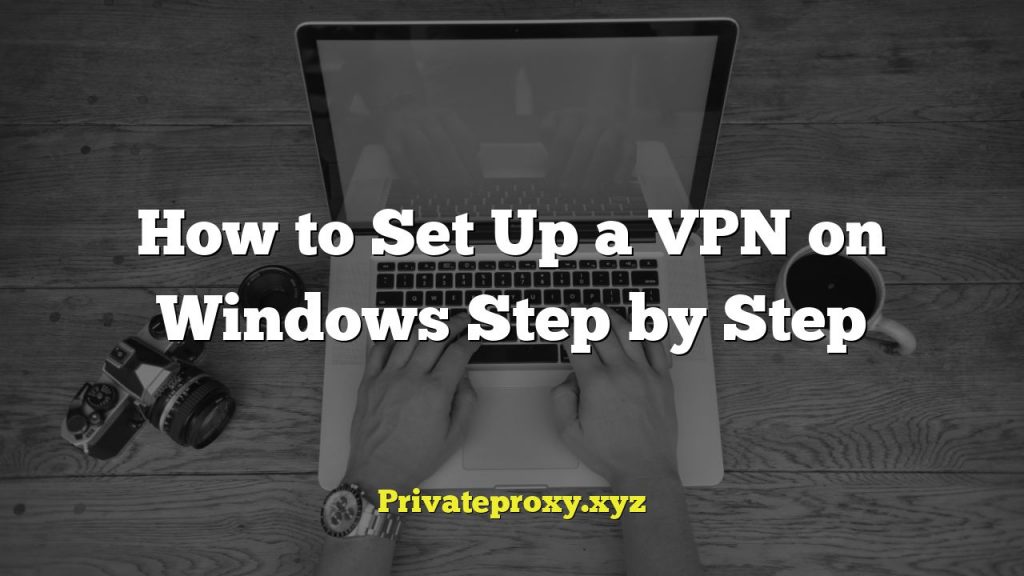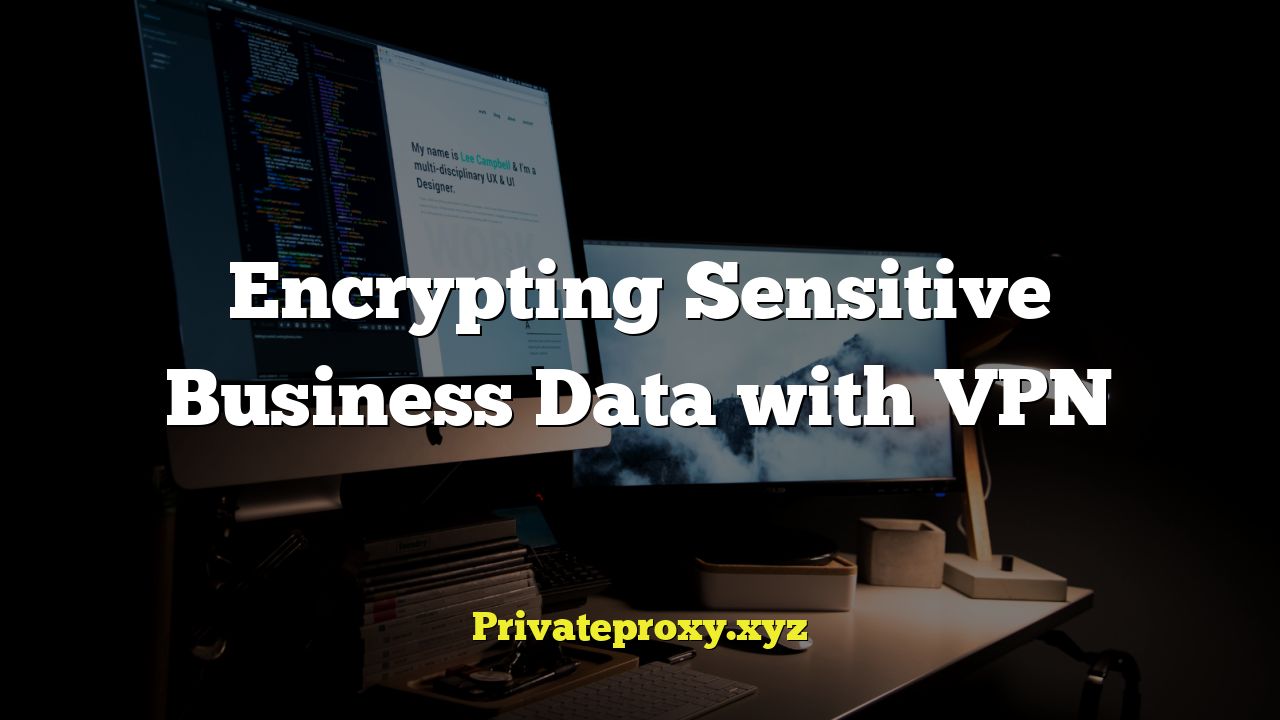
## Encrypting Sensitive Business Data with VPN
In today’s digital landscape, businesses rely heavily on data to operate and thrive. This data, often encompassing sensitive customer information, financial records, intellectual property, and strategic plans, is a valuable asset that needs robust protection. One of the most effective methods for safeguarding this data, especially when transmitted over networks, is encryption using a Virtual Private Network (VPN). This article will delve into the importance of encrypting sensitive business data with VPNs, exploring the technology, benefits, implementation strategies, and best practices.
## Understanding VPNs and Encryption
A VPN, at its core, creates a secure and encrypted connection between a user’s device and a remote server managed by the VPN provider. This connection tunnels all internet traffic through the server, effectively masking the user’s IP address and location. Crucially, the data transmitted through this tunnel is encrypted, making it unreadable to unauthorized parties who might intercept it.
Encryption is the process of converting readable data (plaintext) into an unreadable format (ciphertext) using an algorithm (cipher) and a key. Only someone with the correct key can decrypt the ciphertext back into the original plaintext. VPNs utilize various encryption protocols to secure data, the most common and secure being:
* **AES (Advanced Encryption Standard):** A widely adopted symmetric encryption algorithm known for its speed and strong security. It’s often used with key lengths of 128-bit or 256-bit, with 256-bit AES considered virtually unbreakable with current technology.
* **OpenVPN:** An open-source VPN protocol that supports various encryption algorithms, including AES. OpenVPN is highly configurable and considered very secure due to its open-source nature, allowing for community scrutiny and continuous improvement.
* **IKEv2/IPsec:** A tunneling protocol often paired with IPsec (Internet Protocol Security) for encryption. IKEv2 is known for its stability and fast connection speeds, making it suitable for mobile devices. IPsec provides a framework for securing IP communications by authenticating and encrypting each IP packet.
* **WireGuard:** A relatively new VPN protocol gaining popularity for its speed, simplicity, and modern cryptography. WireGuard is designed to be more streamlined and efficient than older protocols like OpenVPN, making it an attractive option for businesses looking for performance improvements.
The encryption process ensures that even if data is intercepted during transmission, it remains unintelligible to attackers without the decryption key. This is particularly vital when employees access sensitive data remotely, use public Wi-Fi networks, or transmit data across geographically dispersed locations.
## The Importance of Encrypting Sensitive Business Data
The imperative to encrypt sensitive business data stems from several critical factors:
* **Data Breach Prevention:** Data breaches can be devastating for businesses, leading to financial losses, reputational damage, legal liabilities, and loss of customer trust. Encryption significantly reduces the risk of data breaches by rendering stolen data useless to attackers.
* **Compliance Requirements:** Numerous regulations, such as GDPR (General Data Protection Regulation), HIPAA (Health Insurance Portability and Accountability Act), and PCI DSS (Payment Card Industry Data Security Standard), mandate the protection of sensitive data. Encryption is often a core requirement for compliance with these regulations. Failure to comply can result in hefty fines and legal repercussions.
* **Protection of Intellectual Property:** Businesses invest significant resources in developing intellectual property, such as trade secrets, patents, and copyrights. Encrypting this data prevents competitors from gaining unauthorized access and potentially undermining the business’s competitive advantage.
* **Remote Work Security:** With the rise of remote work, employees increasingly access sensitive data from various locations and networks, some of which may be insecure. VPNs provide a secure tunnel for remote workers, ensuring that their data is protected even when using public Wi-Fi hotspots.
* **Securing Cloud Data:** Many businesses rely on cloud services to store and process data. While cloud providers typically offer some level of security, encryption adds an extra layer of protection, ensuring that data remains confidential even if the cloud provider experiences a security breach.
* **Maintaining Customer Trust:** Customers are increasingly concerned about the privacy and security of their personal data. By encrypting data, businesses demonstrate their commitment to protecting customer information, building trust and fostering long-term relationships.
## Benefits of Using VPNs for Data Encryption
Implementing VPNs for data encryption offers a multitude of benefits:
* **Enhanced Security:** The primary benefit of VPNs is the enhanced security they provide through encryption. Data is protected both in transit and at rest, reducing the risk of unauthorized access.
* **Improved Privacy:** VPNs mask the user’s IP address and location, making it more difficult for websites and trackers to monitor their online activity. This is particularly important for businesses that handle sensitive customer data or conduct confidential research.
* **Secure Remote Access:** VPNs provide a secure and reliable way for remote employees to access company resources, regardless of their location or the network they are using.
* **Bypassing Geo-Restrictions:** While not the primary focus for data security, VPNs can also be used to bypass geo-restrictions, allowing employees to access content and services that may be blocked in their current location. This can be useful for research or accessing specific business tools.
* **Cost-Effectiveness:** Compared to implementing and maintaining complex in-house security solutions, using a VPN can be a cost-effective way to protect sensitive data.
* **Ease of Use:** Modern VPNs are often user-friendly and easy to set up, even for non-technical users. This simplifies the process of deploying VPNs across the organization.
## Implementing VPNs for Business Data Encryption
Implementing VPNs effectively requires careful planning and consideration of the business’s specific needs and security requirements. The following steps provide a general framework for implementation:
1. **Assess Security Needs:** Identify the types of data that need protection, the potential threats, and the compliance requirements that apply to the business.
2. **Choose the Right VPN Solution:** Select a VPN solution that meets the business’s specific needs. Consider factors such as security protocols, encryption strength, server locations, user-friendliness, and cost. Options include:
* **Commercial VPN Providers:** Offer pre-built VPN solutions with user-friendly interfaces and a wide range of features. Examples include NordVPN Teams, ExpressVPN Business, and Surfshark. These are often the easiest to deploy and manage.
* **Self-Hosted VPN Servers:** Allow businesses to set up and manage their own VPN servers, providing greater control over security and configuration. This requires more technical expertise but can be more cost-effective for larger organizations. OpenVPN Access Server is a popular choice.
* **Site-to-Site VPNs:** Connect entire networks, such as branch offices, to the main office network. These VPNs create a secure tunnel between the two networks, allowing employees in different locations to access shared resources securely. Cisco and other network equipment vendors offer site-to-site VPN solutions.
3. **Configure the VPN:** Configure the VPN settings to ensure that it provides the desired level of security and performance. This includes selecting the appropriate encryption protocol, setting up authentication methods, and configuring firewall rules.
4. **Deploy the VPN:** Deploy the VPN to all employees who need to access sensitive data. Provide clear instructions on how to install and use the VPN.
5. **Monitor and Maintain the VPN:** Regularly monitor the VPN’s performance and security logs to ensure that it is functioning properly. Keep the VPN software up to date with the latest security patches.
6. **Train Employees:** Educate employees about the importance of using the VPN and how to use it properly. Emphasize the need to connect to the VPN whenever accessing sensitive data, especially when using public Wi-Fi.
7. **Enforce VPN Usage Policies:** Implement policies that require employees to use the VPN when accessing sensitive data. This can be enforced through technical controls, such as blocking access to company resources from devices that are not connected to the VPN.
## Best Practices for Encrypting Business Data with VPNs
To maximize the effectiveness of VPNs for data encryption, follow these best practices:
* **Choose a Reputable VPN Provider:** Select a VPN provider with a strong track record of security and privacy. Research the provider’s logging policies, encryption protocols, and security audits.
* **Use Strong Encryption:** Ensure that the VPN uses strong encryption protocols, such as AES-256. Avoid VPNs that use outdated or weak encryption methods.
* **Enable Multi-Factor Authentication (MFA):** Enable MFA for VPN access to add an extra layer of security. This requires users to provide two or more forms of authentication, such as a password and a code from their mobile device.
* **Regularly Update VPN Software:** Keep the VPN software up to date with the latest security patches to protect against known vulnerabilities.
* **Use a Kill Switch:** Enable the kill switch feature, which automatically disconnects the internet connection if the VPN connection drops. This prevents unencrypted data from being transmitted if the VPN fails.
* **Avoid Free VPNs:** Free VPNs often have limited bandwidth, slower speeds, and may collect user data for advertising purposes. They may also contain malware or other security risks.
* **Educate Employees about Security Risks:** Train employees about the risks of using public Wi-Fi and the importance of using the VPN whenever accessing sensitive data.
* **Implement a Data Loss Prevention (DLP) Solution:** Combine VPNs with DLP solutions to prevent sensitive data from leaving the organization’s control. DLP solutions can monitor data in transit and at rest, and block unauthorized data transfers.
* **Conduct Regular Security Audits:** Conduct regular security audits to identify vulnerabilities and ensure that the VPN is configured properly.
* **Monitor VPN Usage:** Monitor VPN usage to detect suspicious activity and identify potential security threats.
## Conclusion
Encrypting sensitive business data with VPNs is a crucial step in protecting valuable assets and maintaining a secure operating environment. By understanding the technology, implementing robust security policies, and following best practices, businesses can significantly reduce the risk of data breaches, ensure compliance with regulations, and maintain customer trust. As the threat landscape continues to evolve, prioritizing data encryption with VPNs will remain a cornerstone of effective cybersecurity for businesses of all sizes.
